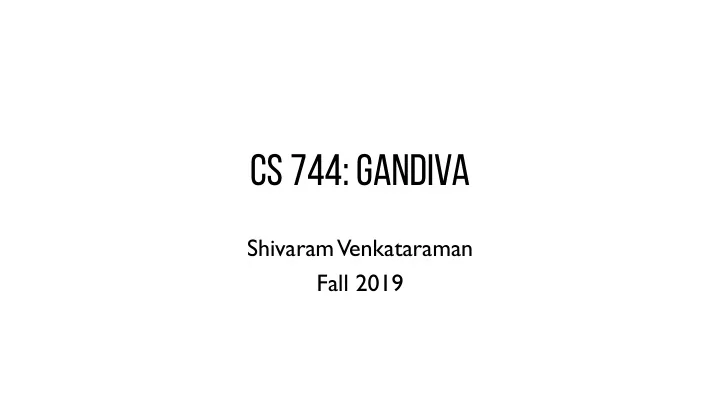

CS 744: GANDIVA Shivaram Venkataraman Fall 2019
ADMINISTRIVIA - Course project proposal - Midterm
Bismarck Supervised learning, Unified Interface Shared memory, Model fits in memory Parameter Server Large datasets, large models (PB scale) Consistency model, Fault tolerance Machine Learning Tensorflow Need for flexible programming model Dataflow graph, Heterogeneous accelerators Ray Reinforcement learning applications Actors and tasks, Local and global scheduler
Applications Machine Learning SQL Streaming Graph Computational Engines Scalable Storage Systems Resource Management Datacenter Architecture
MACHINE LEARNING WORKFLOW?
SHARED ML CLUSTERS Rack
WORKLOAD Feedback-driven exploration
AFFINITY
INTRA JOB PREDICTABILITY
MECHANISMS (1) Rack 1. Suspend-Resume 2. Migration
MECHANISMS (2) Rack 3. Grow-shrink 4. Profiling
SCHEDULING POLICY Goals early feedback cluster efficiency cluster-level fairness? Two modes Reactive Introspective
REACTIVE MODE React to events Job arrivals, departures, failures Hierarchical Preference Nodes with same “ affinity” Nodes with “ different affinity ” Nodes with “no affinity” Suspend-resume …
INTROSPECTIVE MODE Monitor and optimize placement of jobs periodically Actions Packing Migration Grow-shrink
DISCUSSION https://forms.gle/aHYbNcTFdGJtXefj9
What are some guarantees provided by Mesos that are not provided by Gandiva? Explain with an example
Are mechanisms in Gandiva also useful in a cluster running Apache Spark jobs? Provide one example either for or against
NEXT STEPS New module on SQL! Course project introductions Midterm
Recommend
More recommend